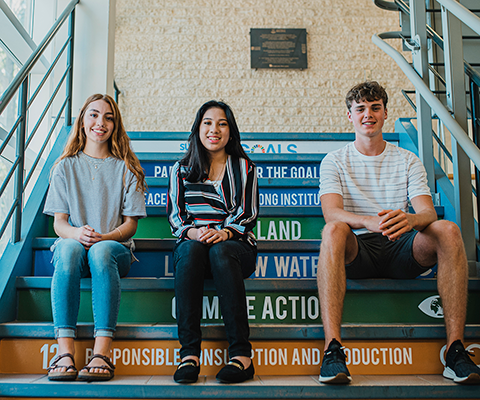University sustainability and post-pandemic recovery: A multi-faceted approach


As the COVID-19 pandemic slowly transitions towards an endemic stage, universities face one of the largest disruptions in their existence. With the forced widespread advent of online and hybrid delivery models of teaching, universities have lost their historic monopolistic advantage to local markets. Gone are the days when many students would attend a nearby university simply because of its geographic convenience. The rise of micro-credentialling and skills-based training has provided universities an opportunity to reflect and expand on their current offerings in their role to provide lifelong learning.
Universities are being forced to adapt to a post-COVID reality. There needs to be change in higher education programming relevant to a world that values sustainability in various forms. There needs to be investment and change in accessibility through quality technological and educational learning techniques. There also needs to be a re-evaluation of the kinds of physical spaces for an increasingly digital and remote world yet one where place-based knowledge of communities and ecosystems is the pathway to a sustainable future. Universities will likely never return to 100% face-to-face operations, and as employers, they will need to embrace flexible working arrangements for a workforce no longer fully in person.
All these disruptions are forcing universities to rethink their models. No longer seen solely as public goods, university funders demand financial sustainability through revenue generation and greater self-sufficiency.
The answer to these pressures is sustainability: sustain key systems and their ongoing benefits over the long-term. Universities also have unique capacities to contribute to sustainable development, including progress on the UN Sustainable Development Goals, in particular, through the liberal arts and sciences where the humanities, social sciences, and natural sciences, especially biology, play a central role.
Luther College, a federated college of the University of Regina, values sustainability. Sustainability is a lens that can be brought to bear in a number of contexts: leadership and governance, practical operational sustainability, and through teaching, scholarship, and research for sustainable development.
Leadership and Governance: Sustainability is a theme and approach to leadership and governance on a small scale at Luther – with economizing oversight operations to single functional areas (i.e. finance, HR) for the separate high school and university campus operations. These economies of scale can also result in more innovation.
Practical Operations: When people think of sustainability, this is often the category most considered: ways of acting that simultaneously sustain both ecosystem health and human well-being. This includes things like recycling programs, energy efficient buildings, and the reduction of waste. It also means taking what is old and making it new, as Luther did with its major refurbishment of the campus residence built in the 1970s. Universities now have an opportunity to increase these efforts to a much larger scale: renewable energy solar and wind farms and water storage on university lands and buildings, sustainable and local food sourcing, locally-grown food for use in our food services, and open equipment sharing for new forms of local production.
Teaching, Scholarship, and Research: Students must be able to experience the value of sustainable development though their programs, integrated learning options, and global scholarship on Education for Sustainable Development (ESD). One such way is incorporating the UN Sustainable Development Goals (SDGs) and Luther’s role in advancing this work holistically throughout the College.
In 2018, the International Association of Universities (IAU) invited individual universities from around the world to lead on specific SDGs. Luther College and the University of Regina were co-tasked with finding at least one other university on each continent to work on SDG 12: Responsible Production and Consumption. Universities from Malaysia, Kenya, Germany, Columbia, and Peru have joined the College on a 4-year journey (so far!) where we share best practices and collaborate on scholarly initiatives.
No matter what pandemic recovery ends up looking like across the Canadian post-secondary landscape – it must be sustainable in many different facets. As a college, we are modelling a new way of intentionally coming together through diverse forms of sustainability. In doing so we will be able to (re)create communities and graduates who become a part of the healing, caring, and rebuilding of the world around us: for this is deeply needed now, more than ever.
Published by
Dr. Marc Jerry
President of Luther College
Dr. Roger A. Petry
Professor of Philosophy, Luther College and Coordinator, RCE Saskatchewan